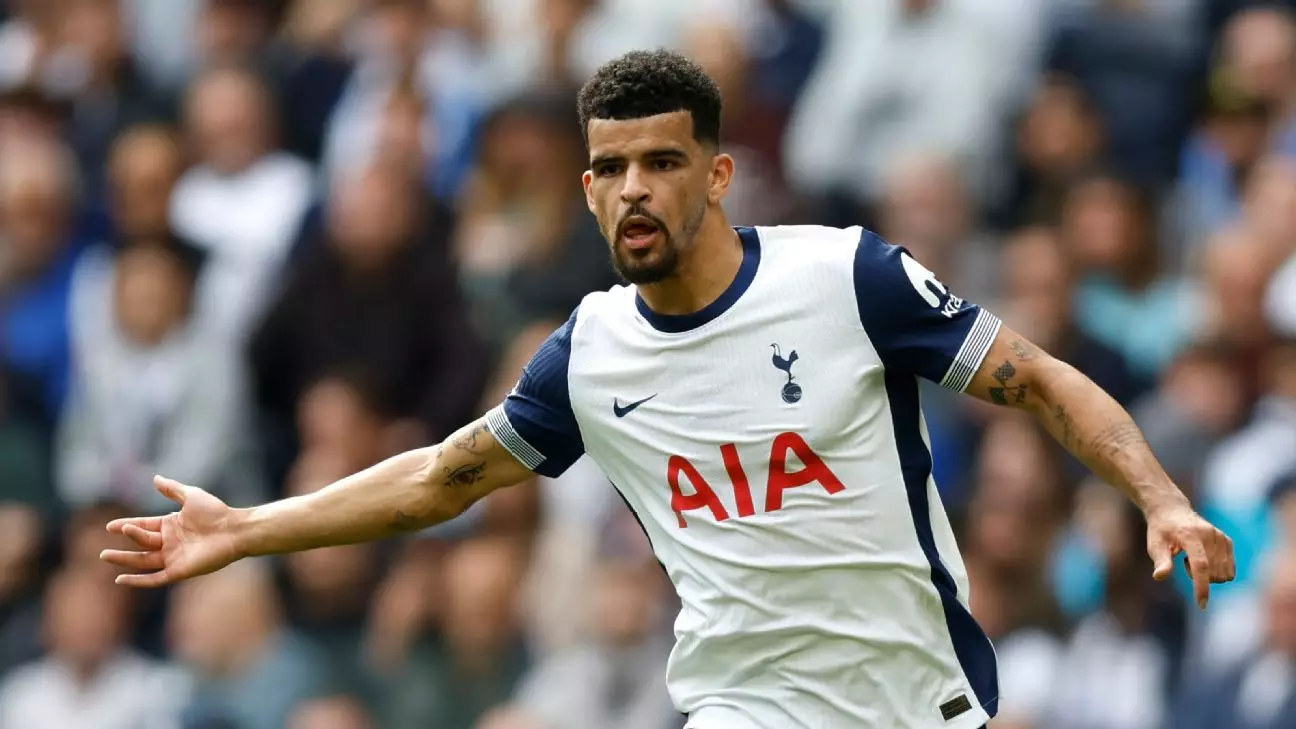In the ever-volatile world of football, a player’s worth is often measured by figures—the hefty price tags that accompany their transfers, the immediate impact they have on a club, and the inevitable comparisons to former legends. Recently, those dynamics have been exemplified in the case of Dominic Solanke, who became Tottenham Hotspur’s club-record signing with a £65 million ($86 million) transfer from Bournemouth. However, as manager Ange Postecoglou has urged, patience is vital when it comes to assessing Solanke’s potential contribution to the team.
It can be demanding for any player stepping into the shoes of a high-profile signing. Solanke’s arrival at Spurs not only raised expectations among the fans but also put him under a glaring spotlight. Despite these pressures, Postecoglou’s call for patience serves as a reminder that players often require time to adapt, especially when their transition is marred by setbacks such as injuries. In Solanke’s case, the ankle injury that sidelined him after merely one game paints a picture of how quickly circumstances can change, limiting his chances to impress and familiarize himself with the squad’s playstyle.
The narrative surrounding Solanke requires nuanced interpretation rather than hasty judgments. Observers might be tempted to dismiss his capabilities merely because he has not scored yet for Spurs or has missed opportunities during a challenging derby match against Arsenal. However, such a limited view overlooks the fact that he is still in the process of recovering from injury and building chemistry with his teammates.
In this cradle of expectations, it’s essential for coaches and fans alike to forge a supportive atmosphere conducive to a player’s growth and acclimatization. Postecoglou’s approach—emphasizing the need to breathe and reassess potential outcomes—suggests that an environment fostering understanding can often yield better performances down the line. Football, intrinsically tied to its emotional highs and lows, can frequently create undue tension that hampers a player’s performance.
Moreover, the potential pitfalls of rash judgment are significant. If Solanke were to find form in subsequent matches and net several goals, would the immediate critiques be brought to light again? Postecoglou’s perspective urges us to consider that footballers, like anyone in their craft, go through ebbs and flows. The prospect of early criticism leading to a detrimental drop in confidence for Solanke is a reality many players face, particularly in the high-pressure arena of the Premier League.
The Australian manager has also shed light on a broader philosophy towards team building and player assessment. As Spurs transition through a rebuilding phase, they have been focused on cultivating an identity on the pitch, a slow process that demands the right personnel in critical areas. The concerted effort to sign Solanke based on his fit within this vision, rather than solely on his price tag, is indicative of a more shrewd strategic layer underpinning the club’s approach.
Upcoming fixtures will test Solanke’s capacity to rise above his current challenges, especially as Spurs prepare for a matchup against Brentford—a club that recently lost a key striker in Ivan Toney. As Spurs face opposition devoid of a potent forward, Solanke’s potential to affirm his worth becomes even more crucial.
With the mixed results observed in Tottenham’s early season matches, the fans’ electric atmosphere has oscillated between supportive cheers and frustrated boos. Postecoglou’s reflective commentary on fan judgment underscores a broader societal trend wherein immediacy often trumps patience. In this era of social media and instant assessments, the pressure to derive conclusions from minuscule sample sizes is rampant.
While he acknowledges that fans are entitled to their opinions, the focus for Postecoglou and his staff must remain on pertinent development goals rather than external noise. In this quest, retaining clarity in vision and purpose is paramount—not just for Solanke, but for the entire brigade of players as they journey through their individual paths of acceptance within the team framework.
Dominic Solanke’s early experiences at Spurs encapsulate the delicate balance between ambitions and actionable patience in professional football. As both he and Postecoglou emphasize, great expectations need not lead to anxious reactions; rather, they can bloom into sustained progress when grounded in reality and supported by an understanding fanbase. Football’s ever-shifting landscape demands this understanding, which can only serve to enrich the beautiful game.

